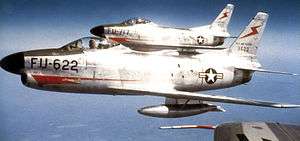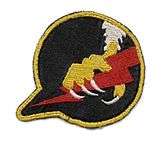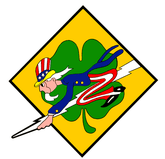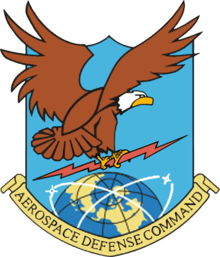432d Fighter-Interceptor Squadron
The 432d Fighter-Interceptor Squadron is an inactive United States Air Force unit. Its last assignment was with the 475th Fighter Group at Minneapolis-Saint Paul International Airport, Minnesota, where it was inactivated on 2 January 1958.
| 432d Fighter-Interceptor Squadron | |
|---|---|
 F-86D Sabres at Truax Field[note 1] | |
| Active | 1943–1949; 1952–1958 |
| Country | |
| Branch | |
| Role | Fighter-Interceptor |
| Nickname(s) | Clover (World War II)[1] |
| Decorations | Distinguished Unit Citation Philippine Republic Presidential Unit Citation[2] |
| Commanders | |
| Notable commanders | Captain (later Colonel) John S. Loisel |
| Insignia | |
| Patch with 432d Fighter-Interceptor Squadron emblem (approved 9 March 1955)[2] |  |
| 432d Fighter Squadron emblem[1] |  |
History
World War II and Army of Occupation
Combat in Southwest Pacific and Western Pacific, 12 August 1943 – 21 July 1945. Occupation duty (Korea and Japan), 1945–1949.[2]
Lineage
- Activated on 14 May 1943 by special authority prior to constitution as 432d Fighter Squadron on 15 May 1943
- Inactivated on 1 April 1949
- Redesignated 432d Fighter-Interceptor Squadron on 10 October 1952
- Activated on 1 December 1952
- Inactivated on 2 January 1958[2]
Assignments
- 475th Fighter Group, 14 May 1943 – 1 April 1949
- 31st Air Division, 1 December 1952
- 520th Air Defense Group, 16 February 1953
- 475th Fighter Group, 18 August 1955 – 2 January 1958[2]
Stations
- Charters Towers, Australia, 14 May 1943
- RAAF Base Amberley, Australia, 11 June 1943
- Dobodura Airfield Complex, New Guinea, 14 August 1943
- Operated from Port Moresby Airfield Complex, New Guinea, 12 August – 1 September 1943
- Nadzab Airfield Complex, New Guinea, 25 March 1944
- Hollandia Airfield Complex, New Guinea, 15 May 1944
- Mokmer Airfield, Biak, Netherlands East Indies, 12 July 1944
- Dulag Airfield, Leyte, 2 November 1944
- Detachment operated from San Jose, Mindoro, Netherlands East Indies, 5 February – 2 March 1945
- Clark Field, Luzon, Philippines, 27 February 1945
- Lingayen Airfield, Luzon, Philippines, 19 April 1945
- Ie Shima Airfield, Okinawa, 8 August 1945
- Kimpo Air Base, Korea, 28 September 1945
- Itazuke Air Base, Japan, 28 August 1948
- Ashiya Air Base, Japan, 25 March – 1 April 1949
- Truax Field, Wisconsin, 10 October 1952
- Minneapolis-Saint Paul International Airport, Minnesota, 18 August 1955 – 2 January 1958[2]
Aircraft
- Lockheed P-38 Lightning, 1943–1946
- North American P-51 Mustang, 1946–1949
- North American F-86D Sabre, 1952–1955
- Northrop F-89D Scorpion, 1955–1956
- Northrop F-89H Scorpion, 1956–1957[2]
gollark: Terra: wrong answer.
gollark: You could just switch to Haiku.
gollark: I run a Windows VM so that I can use the WSL to run Wine to run Putty.
gollark: I should just replace Terrariola as the theoretically-admin.
gollark: As a cool Linux user I can just use SSH natively in a terminal.
References
Notes
- Explanatory notes
- Aircraft are North American F-86D-40-NA Sabres. Identified aircraft include serial numbers 52-3622 and 52-3717
- Aircraft is Northrop F-89H-5-NO Scorpion serial 54-409, stationed at Minneapolis-Saint Paul International Airport, Minnesota. Taken at Indian Springs Air Force Auxiliary Field, Nevada, armed with a "Genie" nuclear missile. Aircraft fired the nuclear weapon as the "John Shot" of Operation Plumb Bob, 19 July 1959
- Citations
- Watkins, p. 40
- Maurer, Combat Squadrons, pp. 534–535
Bibliography
![]()
- Cornett, Lloyd H; Johnson, Mildred W (1980). A Handbook of Aerospace Defense Organization, 1946–1980 (PDF). Peterson AFB, CO: Office of History, Aerospace Defense Center. Retrieved 23 March 2012.
- Maurer, Maurer, ed. (1983) [1961]. Air Force Combat Units of World War II (PDF) (reprint ed.). Washington, DC: Office of Air Force History. ISBN 0-912799-02-1. LCCN 61060979. Retrieved 17 December 2016.
- Maurer, Maurer, ed. (1982) [1969]. Combat Squadrons of the Air Force, World War II (PDF) (reprint ed.). Washington, DC: Office of Air Force History. ISBN 0-405-12194-6. LCCN 70605402. OCLC 72556. Retrieved 17 December 2016.
- Watkins, Robert A. (2013). Insignia and Aircraft Markings of the U.S. Army Air Force In World War II. Volume V, Pacific Theater of Operations. Atglen,PA: Shiffer Publishing, Ltd. ISBN 978-0-7643-4346-9.
- "ADCOM's Fighter Interceptor Squadrons". The Interceptor. Aerospace Defense Command. 21 (1): 5–11, 26–31, 40–45, 54–59. January 1979.
External links
This article is issued from Wikipedia. The text is licensed under Creative Commons - Attribution - Sharealike. Additional terms may apply for the media files.

